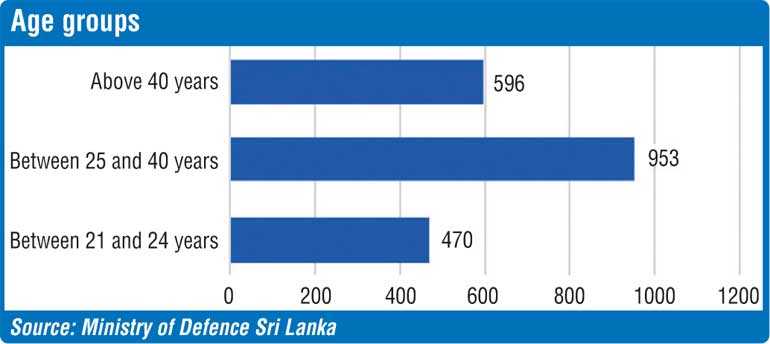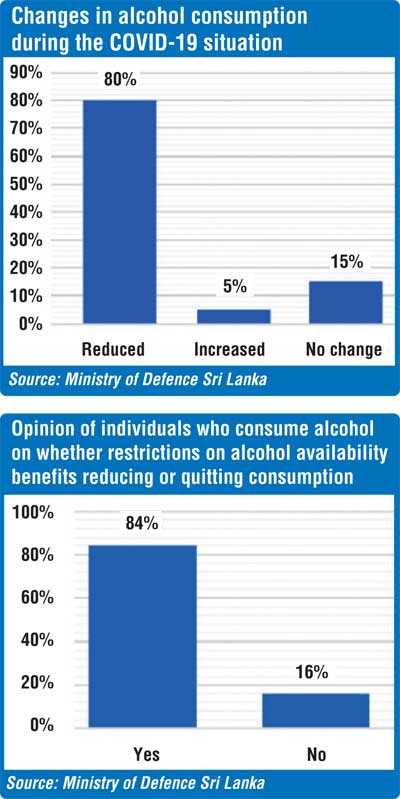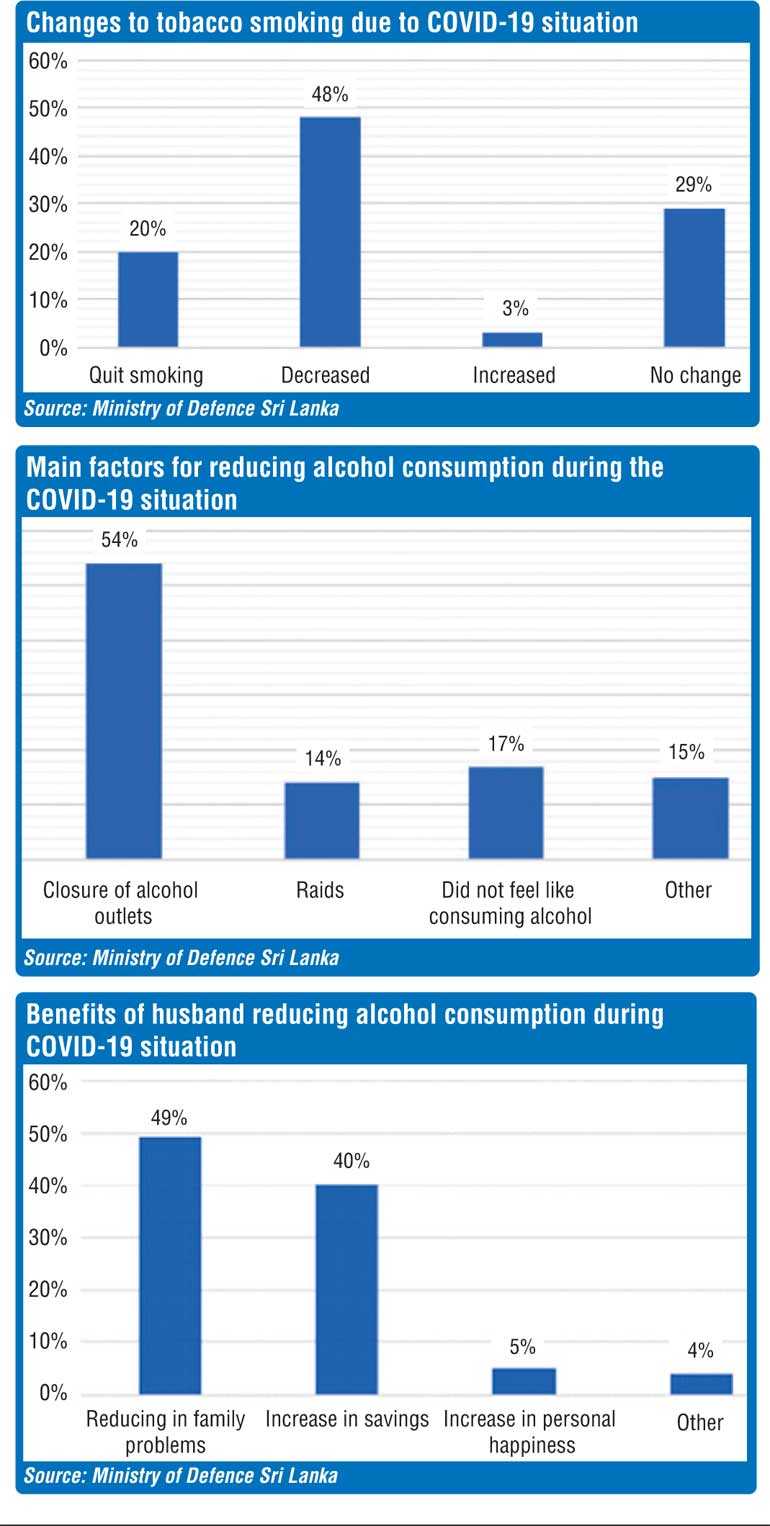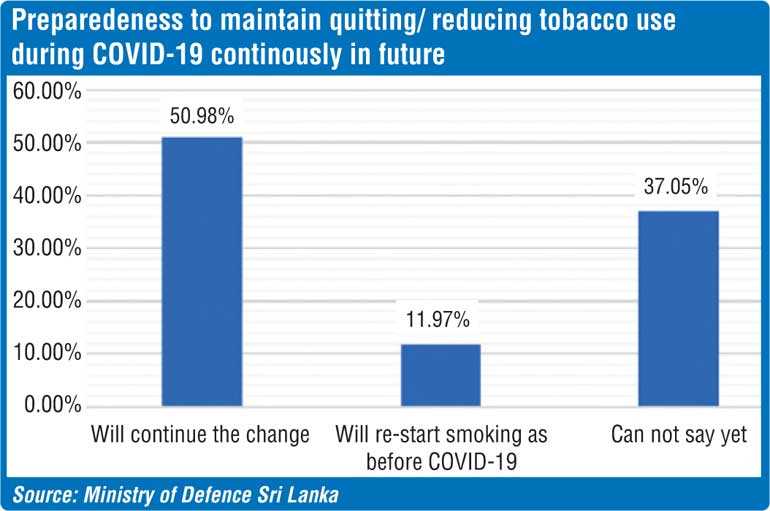Sunday Apr 20, 2025
Sunday Apr 20, 2025
Wednesday, 20 May 2020 00:00 - - {{hitsCtrl.values.hits}}

 People have given up 80% of alcohol and 68% of tobacco consumption in Sri Lanka during the pandemic based policy restrictions, reveals Alcohol and Drug Information Centre (ADIC) in Sri Lanka in a recent research.
People have given up 80% of alcohol and 68% of tobacco consumption in Sri Lanka during the pandemic based policy restrictions, reveals Alcohol and Drug Information Centre (ADIC) in Sri Lanka in a recent research.
Amidst the pressure of COVID-19 spread in the country, ADIC has conducted a study into alcohol users and smokers, including families, based on their consumption pattern of alcohol and tobacco, and relative changes with regard to the consumption during the coronavirus spread, while curfew is in force in the country.
The research has revealed a drastic reduction in alcohol and smoking, and the willingness of people to continue the same practice even at the termination of restrictions imposed. It also revealed an upsurge of correlated savings in respective households, and the possibility of being free once people realises that it is more comfortable to live without these substances.
ADIC is an organisation which is working towards the reduction of alcohol, tobacco and other drugs and also advocates for effective policy formations to control and contain alcohol, tobacco and other drugs in all the regions nationally and internationally.
The findings are as follows.
The study has been conducted from 1 to 10 May this year based on a sample of 2019 individuals covering the island inclusive of 25 districts proportionately. Accordingly, 23% of respondents within the sample were in between 21 to 24 years of age while 47% were between 25 to 40 years, and 30% were over 40.
An overall 84% of respondents, those who have either given up or reduced their alcohol consumption were due to restrictions imposed on alcohol availability and the same has been helpful for them to quit/reduce their alcohol usage.
It can be concluded that, a large proportion of respondents held this opinion, because under normal circumstances many users forego benefits of alcohol-free life, which this special situation of COVID-19 has enabled them to experience the benefits of becoming a non-alcoholic.
Only 16% respondents have claimed that, restrictions did not help them to stop or reduce their alcohol addiction.
According to the responses of spouses of men, those who have consumed alcohol, reduction of 49% family problems and responsive 40% increase of family savings have been figured in the study.
This graph shows that out of those who were smoking tobacco, a majority of 68% have reduced their smoking habits during the pandemic. Among them, 48% have reduced smoking while 20% quit smoking. This may have resulted because individuals who smoke would have used the COVID-19 pandemic as an opportunity either to reduce or quit the habit of smoking.
51% of those who have reduced/given up tobacco smoking during COVID-19 reported that they are prepared to continue this change in the future even after the situation normalises.
The overall results of the study has found that during the COVID-19 situation in Sri Lanka, alcohol consumption among 80% of alcohol users and smoking among 68% of tobacco smokers has reduced.
Out of the individuals who have quitted/reduced alcohol consumption during the COVID-19 situation, 37% claimed that they are prepared to continue their change, even in the future after the situation normalises.
Out of the individuals who quitted/reduced smoking during COVID-19 situation, 51% claimed that they are prepared to continue their change in future even after the situation normalises.
Among the spouses of men who have consumed alcohol, 49% reported family problems have been reduced due to respective husbands quitting their alcohol consumption. Responding to the same, 40% reported that there was a responsive increase in family savings too.
Therefore, results of this study show that limited availability of alcohol and tobacco has compelled the users to reduce/quit the use of these two substances. Even though it may be difficult to quit/reduce use and experience its benefits under normal circumstances, this study shows that the situational influences during COVID-19 has provided a chance to experience the benefits of being free from use.
Globally, alcohol and tobacco industries are against sales restrictions and reduced availability of their products, because users will quit the addiction by realising that, they can live without these substances and specifically by understanding that, it is more comfortable to live free from these substances.


Discover Kapruka, the leading online shopping platform in Sri Lanka, where you can conveniently send Gifts and Flowers to your loved ones for any event including Valentine ’s Day. Explore a wide range of popular Shopping Categories on Kapruka, including Toys, Groceries, Electronics, Birthday Cakes, Fruits, Chocolates, Flower Bouquets, Clothing, Watches, Lingerie, Gift Sets and Jewellery. Also if you’re interested in selling with Kapruka, Partner Central by Kapruka is the best solution to start with. Moreover, through Kapruka Global Shop, you can also enjoy the convenience of purchasing products from renowned platforms like Amazon and eBay and have them delivered to Sri Lanka.
Discover Kapruka, the leading online shopping platform in Sri Lanka, where you can conveniently send Gifts and Flowers to your loved ones for any event including Valentine ’s Day. Explore a wide range of popular Shopping Categories on Kapruka, including Toys, Groceries, Electronics, Birthday Cakes, Fruits, Chocolates, Flower Bouquets, Clothing, Watches, Lingerie, Gift Sets and Jewellery. Also if you’re interested in selling with Kapruka, Partner Central by Kapruka is the best solution to start with. Moreover, through Kapruka Global Shop, you can also enjoy the convenience of purchasing products from renowned platforms like Amazon and eBay and have them delivered to Sri Lanka.